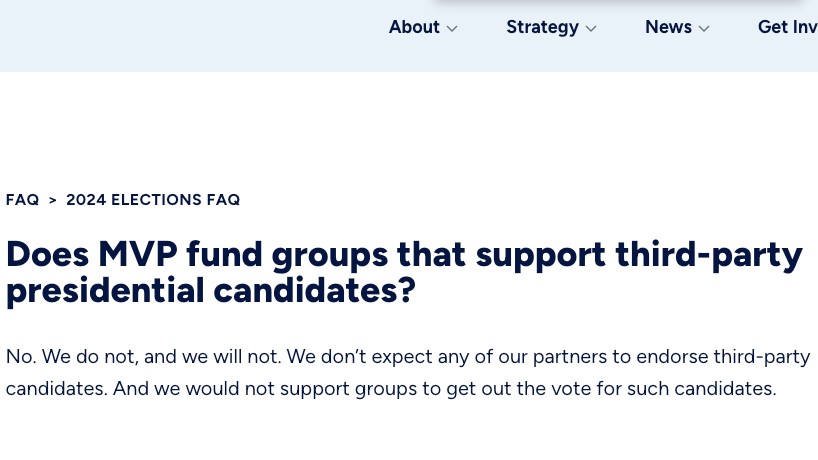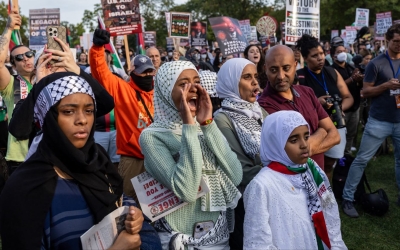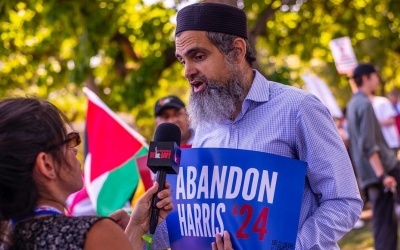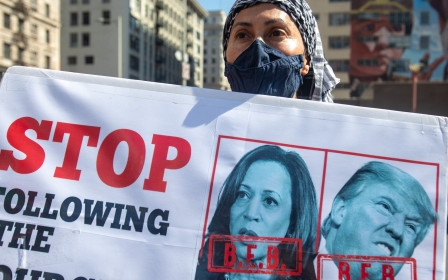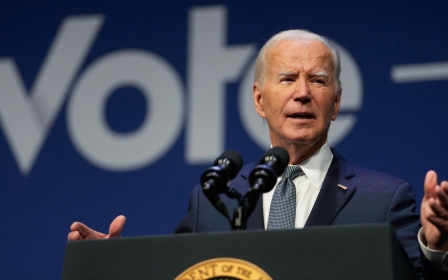US elections 2024: Uncommitted movement splits after taking money from PAC supporting Harris
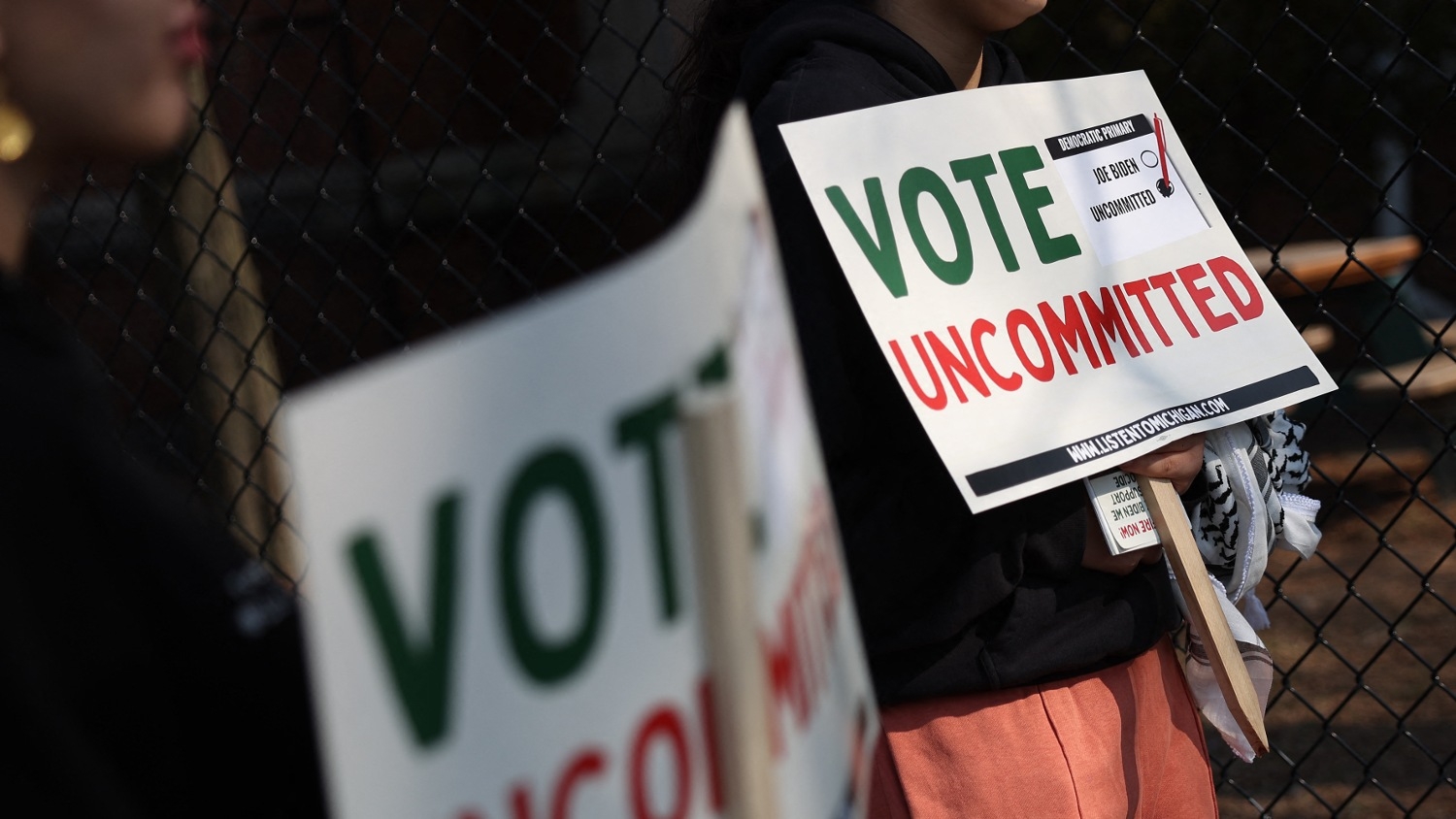
The Uncommitted National Movement, which promised to leverage constituents' votes to force the Democratic Party to change its position on Israel, received more than $400,000 from a Democratic-aligned PAC that explicitly prevents beneficiaries from endorsing a candidate other than Kamala Harris, Middle East Eye can reveal.
Several activists and volunteers told MEE that the payments appear to explain why the movement refused to endorse a third-party presidential candidate, choosing instead to redeem the Democratic Party among disgruntled voters once it became clear the Biden-Harris administration would not alter course on Israel’s devastating war on Gaza.
The revelations kicked off a firestorm in October amongst Arab-American activists and others formerly part of the Uncommitted movement. They say they felt betrayed by the movement after it began all but endorsing Kamala Harris despite receiving no commitments from the Democratic Party on their demands regarding Gaza and US military support for Israel.
Volunteers across the swing states chronicled how they had joined a grassroots campaign in early 2024 that they believed would continue using their votes as leverage to pressure Biden - and then Harris once Biden dropped out - over the Democrats' unwillingness to change their policy on Israel.
In the weeks and months that followed, hundreds of thousands of Americans aligned themselves with Uncommitted, in what was seen as an unprecedented push against the Democratic Party.
New MEE newsletter: Jerusalem Dispatch
Sign up to get the latest insights and analysis on Israel-Palestine, alongside Turkey Unpacked and other MEE newsletters
But former organisers within Uncommitted, who have now launched their own group, "Uncommitted Grassroots", say the findings show they were deceived by a group of Democratic Party-aligned operatives who were intent on merely rescuing the party, not holding it accountable.
According to Federal Election Commission (FEC) filings, the Uncommitted National Movement received $100,000 from the Movement Voter Project, a Democrat-aligned organisation that funnels money into grassroots campaigns, the same day the Uncommitted National Movement was founded, on 18 March. The filings show that funds were transferred to Listen to Us, the financial arm of the Uncommitted National Movement.
Beneficiaries of funding from the Movement Voter Project are explicitly told to support the Democratic Party.
"We don’t expect any of our partners to endorse third-party candidates. And we would not support groups to get out the vote for such candidates," the Movement Voter Project says on its website, in response to a question about whether it funds groups that support third-party presidential candidates.
FEC filings show that on 20 March, the PAC dumped another $60,000 into Listen to Us. MEE found FEC filings showing that Listen to Us received a total of $430,000 from the Movement Voter Project and the Movement Voter PAC.
Similarly, the Movement Voter Project poured $15,000 into the Uncommitted Minnesota campaign, on 21 March.
Members of Uncommitted Grassroots told MEE that they were stunned to learn the group had received funding from a Democratic PAC, and called for a public inquiry into how this deal had been arranged and with whom inside the Uncommitted leadership.
"The Democrats, they can buy a few individuals here and there, but they cannot buy the people. They will not buy us," said Nidal Jaboor, a member of the steering committee for Uncommitted Grassroots.
"We are not going to be threatened. We are not going to be manipulated anymore," Jaboor said.
A spokesperson with the Uncommitted National Movement told MEE that "it seems like Movement Voter Project does support third parties like Working Families Party". The Working Families Party is a progressive political party that often works with the Democrat Party, both by running under Democratic tickets and also endorsing Democrat candidates.
The Movement Voter Project did not reply to MEE’s request for further clarity on the terms of its contributions to the Uncommitted National Movement.
The story of Uncommitted
The Uncommitted National Movement formed in March 2024, after community leaders in Michigan began floating the idea of voting "uncommitted" in the Democratic presidential primary election, due to the Biden administration’s refusal to support a ceasefire in Gaza.
By March 2024, the US had vetoed a ceasefire resolution three times since 7 October 2023.
Prior to the creation of the national group, constituents in Michigan began registering for the Democratic Party in February in an attempt to vote "uncommitted", an option only available on Democrat ballots in the primary election. More than 100,000 in Michigan ended up voting "uncommitted".
The grassroots movement in the state energised hundreds of thousands around the country who felt empowered to send a message to the Biden-Harris administration that they would not be taken for granted.
The success in Michigan prompted similar campaigns in Minnesota, Hawaii, and Washington state. Following the wave of successes of these different uncommitted campaigns, the formation of the Uncommitted National Movement was announced on 18 March.
In all, 37 Uncommitted delegates were elected to attend the Democratic National Convention in August, where the Democratic nominee for president would formally be chosen by delegates.
At the helm of the national organisation were Michigan organisers Layla Elabed, Lexis Zeidan, and Abbas Alawieh.
Waleed Shahid, a senior Democratic strategist, and a cofounder of the national group, played a key role in its organising tactics.
Several people who spoke to MEE said that after the formation of the Uncommitted National Movement, the leaders of the movement began to hold private meetings and discussions, and made decisions without consulting the larger movement. Several recounted how organisers unilaterally kicked out members from group chats when they either brought up the idea of voting third-party or if they expressed disagreement or dissent from what the leadership was saying.
Others alleged that only certain moderate voices were allowed to speak to the media so that the messaging did not venture into abandoning the Democrats, with the goal of remaining amenable to the mainstream corporate media.
In response to questions from MEE, a spokesperson with the Uncommitted National Movement, said: "From the very beginning, we were clear about our strategy to pressure Democratic policymakers from within the party as we also worked to block Trump and his plans to crack down on our anti-war movement."
'If I knew the Uncommitted Movement would never endorse a third party, I would have never joined'
- Aladdin Shahin
"If our strategy were to abandon our political influence in the Democratic Party altogether, we would have taken that path from the start rather than investing in an internal Democratic Party primary process," an Uncommitted National Movement spokesperson, told MEE.
In August, tensions reached a tipping point at the Democratic National Convention (DNC), where Harris was scheduled to be crowned as the party’s candidate ahead of November’s election.
Maamoun Slayhi, who joined the Uncommitted campaign in Minnesota, said many members called for an escalation in tactics and for the leadership to make a call on continuing to withhold votes, if demands were not met. But these calls were ignored.
"A lot of people were expressing frustration with the situation, and we're like, you're not listening to what we are saying," Slayhi told MEE.
Slayhi said he and others in Minnesota were told to wait until the DNC took place, so that Uncommitted could show the Democratic Party how much support they have behind them.
Several volunteers who joined the initial Uncommitted campaign in Michigan told MEE that they had different understandings of the long-term strategy of the movement, in the event of the Biden-Harris administration’s refusal to change track. But they say organisers repeatedly shut down discussions when long-term plans were probed.
Kristina Beverlin, an organiser of the Uncommitted campaign in Washington state, who was one of many removed from a group chat, said several organisers were perplexed as to the logic and approach of the original movement.
Beverlin told MEE this created cynicism towards the leadership.
"Grassroots people tend not to separate people who are willing to make deals with the establishment from the establishment," Beverlin said.
"From everything I have heard in all the conversations I have had, I don't think people at this point are separating some of the people within the Uncommitted leadership from the DNC. I certainly see them as part of the DNC infrastructure."
With the massacres and displacements in Gaza increasing by the day, the grassroots call from pro-Palestine and anti-war activists had moved to a desperate and urgent call for an arms embargo, while Uncommitted appeared intent instead on shifting the goalposts to remain both amenable to the Democratic establishment and the media.
These tactics appeared to backfire when Uncommitted found an unfazed Democratic establishment, unwilling to cede any ground.
After it became clear the DNC and Harris's team would not budge on policy demands, it shifted its central demand to the bare minimum: allow a Palestinian-American delegate to address the August convention.
But the DNC refused that as well.
Leaders of Uncommitted were seen pleading at the entrance of the convention centre during a sit-in, asking for the party to allow the already-vetted speech to take place.
That speech, "leaked" later to the media, showed that the Uncommitted leadership had hoped to convey this message: by allowing a Palestinian to speak, it would help them convince disgruntled constituents to remain loyal to the party.
Though the move did not reap dividends, it elicited a media spectacle which boosted the Uncommitted movement into the national discourse.
But it didn’t move the Democratic establishment.
Even then, Uncommitted leaders, like Shahid the strategist, described the media spectacle as "a success" in the long-term realignment of the Democratic Party on the issue of Palestine.
Shahid went on to compare the number of times Uncommitted was mentioned in the mainstream media as equivalent “to airing 424 primetime ads nationwide”. After backlash, he deleted the post he had made about it on Twitter.
Shortly after the DNC, Uncommitted came out with a statement saying it would not endorse Harris for president but also urged voters against voting for any other alternative.
It sent volunteers and activists into a tailspin, with several coming to the realisation that they were on separate teams from the beginning.
But the revelations of the money trail between the Democrat-aligned PAC that explicitly rejects the endorsement of a third party was the final straw for many.
Aladdin Shahin, an activist from Dearborn, Michigan, who also joined Uncommitted in its early days as a way to direct his outrage over the horrors in Gaza into something productive, says he was disheartened when he discovered the money trail.
"If I knew the Uncommitted movement would never endorse a third party, I would have never joined. I would have never registered as a Democrat. I would have never told people to go vote in the primary,” Shahin told MEE.
Others said the implicit endorsement of Harris was a breach of trust.
"It's betrayal and disbelief that they would do something like that," Slayhi, from Minnesota, said.
Early last week, Uncommitted co-founder Abbas Alawieh, a Lebanese American and former chief of staff to Congresswoman Cori Bush, told CNN that he would be voting for Harris on 5 November, even though his movement was not endorsing her.
Meanwhile, Elabed said that she would be leaving the option for president in her ballot blank.
Uncommitted Grassroots
Battered and bruised by a Democratic Party that had secured their votes based on being the “lesser of two evils” back in 2020 and then later by the Uncommitted National Movement, which had pretended to push against the political establishment, not implicitly endorse it, volunteers and organisers formed Uncommitted Grassroots on 30 October.
"Over the last few months, a small group of individuals have made decisions on behalf of our nationwide movement," it said in a stinging rebuke of the original uncommitted grouping.
"These individuals, without consulting our broader coalition and without being democratically chosen, changed the way that the movement operated from one that challenged the Democratic Party to one that completely catered to the party’s needs at the DNC."
The signatories of the Uncommitted Grassroots have reached more than 120, and the list includes former Uncommitted delegates.
'These individuals...changed the way that the movement operated from one that challenged the Democratic Party to one that completely catered to the party’s needs'
- Uncommitted Grassroots
The new group immediately released a statement recommending that everyone who joined the Uncommitted movement vote third-party in these elections - a direct counter to the Uncommitted National Movement, which urged against voting either third-party or for Donald Trump.
"We didn't leave the Democratic Party. The Democratic Party left us. They left us behind,” said Shahin.
With early voting already underway and polls expected to end on 5 November, it is unclear how much of a dent the new group will have on the overall vote.
But organisers said they formed the group in a bid to distinguish themselves from the original group, as well as to fulfil the promise they had made when they first joined the movement: to withhold votes from the Democrats if they did not change track on Israel’s war on Gaza.
Whereas the Uncommitted movement's media outreach was led by democratic strategists, like Shahid, with connections and ties to the mainstream media, volunteers say their new group, calling for abandoning Harris, has made no dent in the national media.
MEE has seen that there has been no substantial reporting of the group's efforts by any major newspaper, despite the widespread coverage the original organisation received in the past several months.
Where the Uncommitted campaign goes from here is uncertain. But the many uncommitted voters who feel like they were chewed up and spit out by the Uncommitted National Movement leadership plan to remain politically engaged.
For Shahin, the experience was a steep learning curve in US politics.
"In my community, whoever is not voting Green is voting Red. No one from my circle is voting for Kamala Harris, and not even simply because of the genocide. They didn't even want to listen to us."
"Even if we want to try to negotiate, even if we want to try to communicate with them, they just don't want to hear us.
In response to a series of questions from MEE, a spokesperson for the Uncommitted National Movement sent the following statement:
"A respect for the diversity of strategies is helpful in this moment to move away from a decades-old policy of this country supporting Israel's militarism over Palestinian humanity."
Middle East Eye delivers independent and unrivalled coverage and analysis of the Middle East, North Africa and beyond. To learn more about republishing this content and the associated fees, please fill out this form. More about MEE can be found here.




